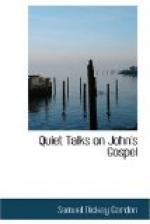They were eye and ear-witnesses of the stirring events of those last days in Jerusalem. The stupendous story of the raising of the man out in the Bethany suburb was the talk of the city. And then there was that intense scene of the kingly entry into the city amid the acclaiming multitudes. They knew of the official opposition, and the public proclamation against Jesus. They breathed the Jerusalem air. That put them in touch with the whole situation.
Now notice keenly they seek a personal interview with Jesus. This is the practical outcome of the situation to them. It reminds one of that other man, under similar conditions though less intense, at an earlier stage, cautiously seeking a night interview. Their desire tells not curiosity but earnestness, and the very earnestness reveals both purpose and attitude towards Jesus.
And this is made the plainer by the very words they use as they seek out the likeliest man of the Master’s inner circle to secure the coveted interview. They say, “Sir, we would see Jesus.” The whole story of conviction, of earnestness, of decision, is in that tremendous little word “would.” It was their will, their deliberate choice, to come into personal relations with this Man of whom they were hearing so much.
And it seems like a direct allusion to that tremendous word, and an answer to it, when Jesus, in effect, in meaning, says, “if any man would follow Me.” Both the coming under such circumstances, and the form of the request, seem to tell the attitude of these men towards Jesus and their personal purpose regarding Him. It would be altogether likely that they accompany Philip as he seeks out Andrew. It would be the natural thing. And so they are with Philip and Andrew as they come to tell Jesus.
Then this would be the setting of these memorable intense words that Jesus now utters.[71] He senses at once the request and the earnest purpose of these men seeking Him out. It is for them especially that these words are spoken. And if, as some thoughtful scholars think, Jesus spake here, not in His native Aramaic, but in the Greek tongue, it gives colouring to the supposition. The intense earnestness of His words, and the revealing of the intense struggle within His spirit as He breathes out the simple prayer,—all this is a tacit recognition of the spirit of these Greeks.
The parallel is striking with the Nicodemus interview where no direct mention is made of the faith that later events showed was unquestionably there. It seems like another of those silences of John that are so full of meaning.[72] And the silence seems, as with Nicodemus, to mean the acquiescence of the inquirers in the message they hear.
This then would seem to be the reply to the request. They have indeed seen Jesus. And they accept it and Him, as most likely they linger through the Passover-days at hand and then turn their faces homeward. And so the warm wooing has drawn out this warm response from the cultured Greek world.




